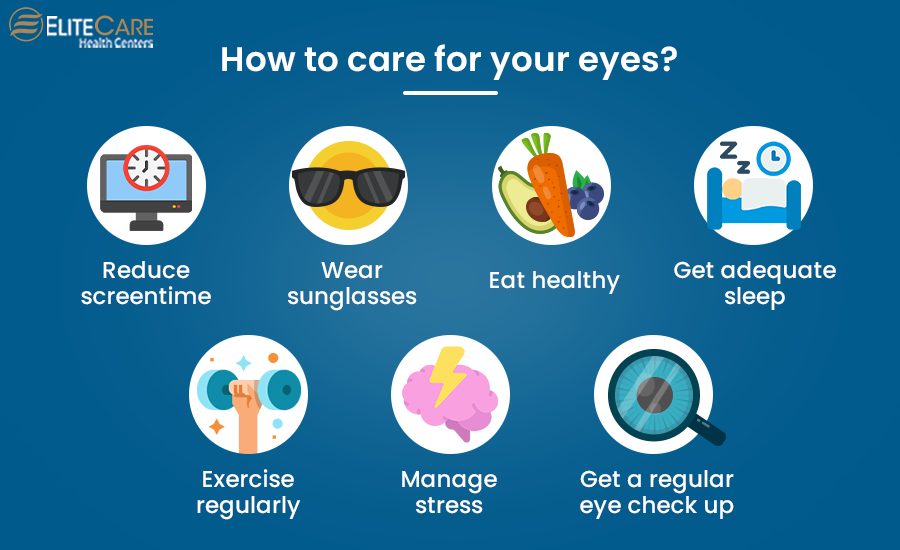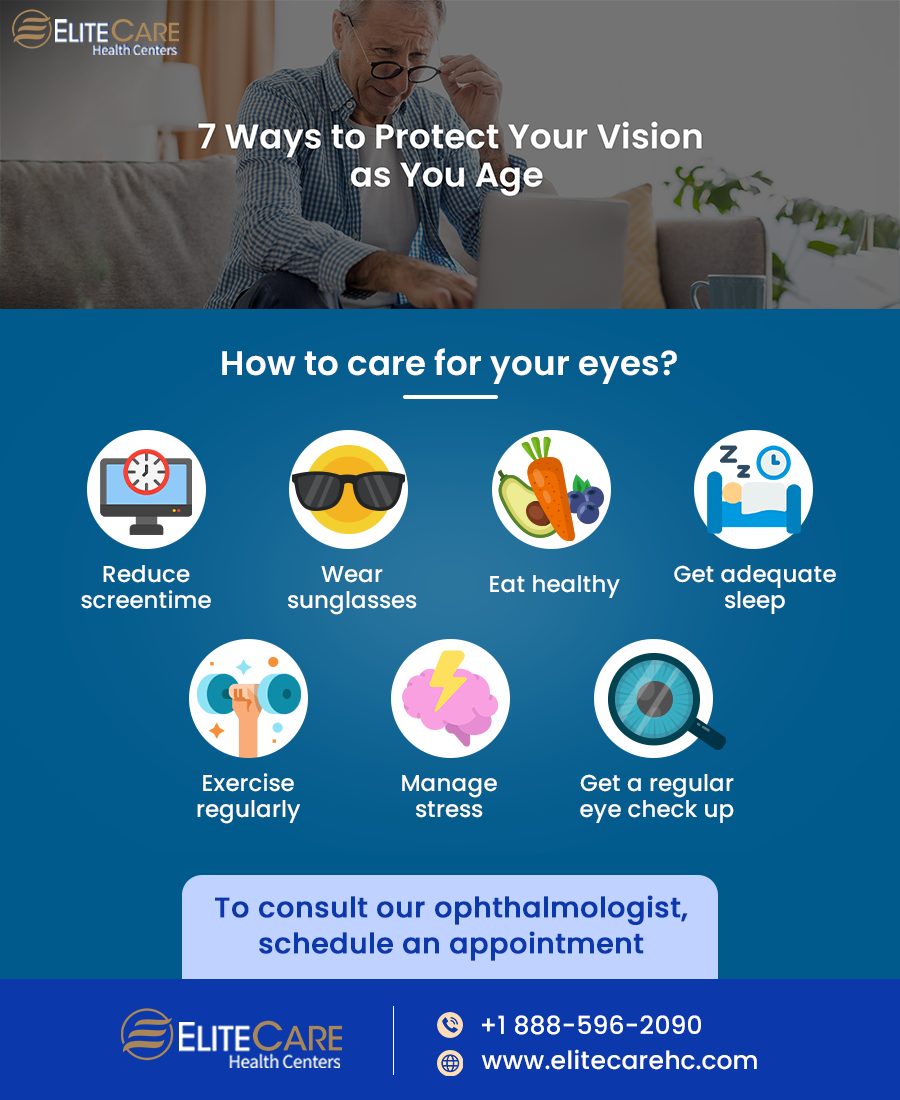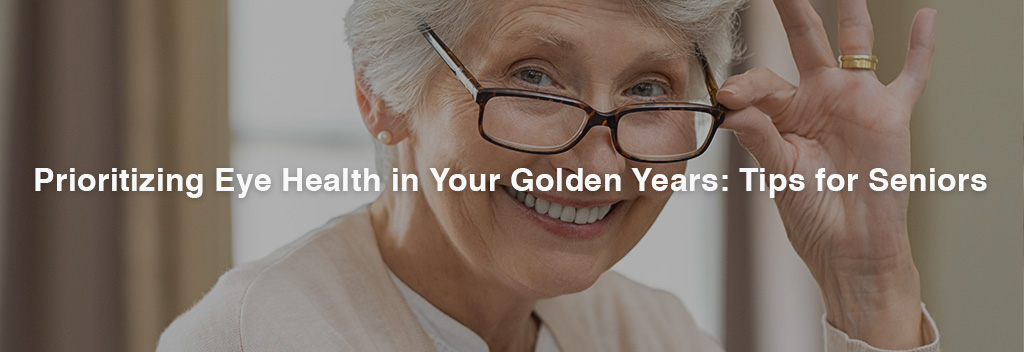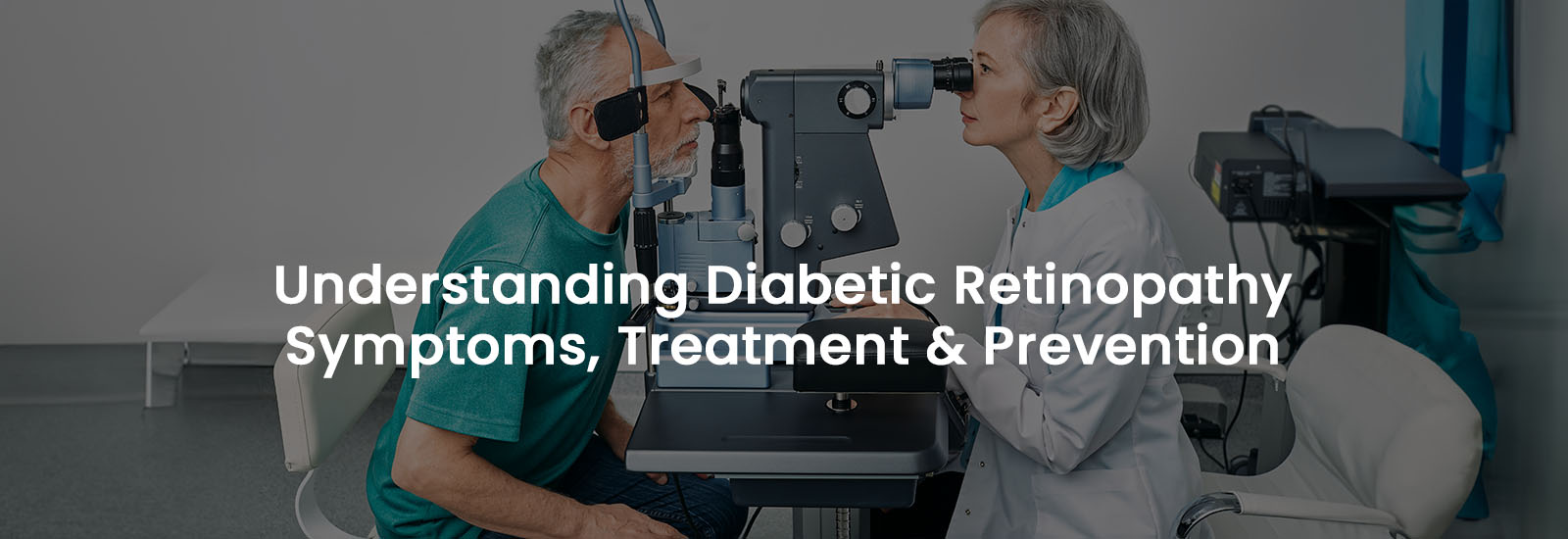
Our body undergoes several changes as we age, and our eyes and our vision are no exception. In adults over 40, the risk of eye disease increases even further. Nearly 3 million older Americans get affected by eye diseases that eventually lead to vision impairment. Therefore, it is important to get the eyesight test, eye pressure test, and eye dominance test done on time.
The most common side effects of aging are presbyopia and myopia. While presbyopia refers to the loss of clear vision up close, myopia is a condition in which seniors cannot focus on faraway objects. These conditions are manageable with prescription eyeglasses, contact lenses, and corrective surgery. In addition to these conditions, there are a few eye issues that can cause more damage to seniors’ vision and eyesight. They are as follows:
- Dry eyes
- Age-related muscular degeneration (AMD)
- Cataracts
- Glaucoma
- Diabetic retinopathy
How to care for your eyes

Eye diseases can result in vision loss if they are left untreated for a long time. Problems with vision can result in social isolation, falls, and accidents, as well as depression. Most eye diseases are not completely curable. Therefore, seniors need to put more emphasis on preventive measures. Here are a few ways older adults can take care of their eyes.
1. Reduce screentime
Using electronic devices for long periods can lead to cataracts, presbyopia, myopia, and other vision problems. Thus, it is crucial for seniors to reduce their screen time. Here are a few things they should always keep in mind while using any digital device.
- Maintain about 60-65 cm between yourself and the device.
- Take frequent breaks (every 20 minutes) to allow your eyes some rest.
- During breaks, follow the 20-20-20 rule. After every 20 minutes spent looking at a screen, look at least 20 feet into the distance and hold for at least 20 seconds.
- Adjust the brightness levels on your screen according to the ambient lighting.
- Reduce exposure to blue light and opt for reading mode instead. Reading mode allows the screen to have a yellowish tint, which is less harmful to the eyes.
- Consider eyeglasses with an anti-reflective lens coating that will reduce the amount of light reflected off the lens surface.
- Blink more while using a device to avoid dry eyes.
2. Wear sunglasses
UV rays are a key cause of cataracts in the eyes. It is harmful to the lens, the retina, and the cornea. The most effective way to prevent UV light from damaging the eyes is by wearing sunglasses. However, select the color of your sunglasses carefully, preferably with the guidance of an ophthalmologist. Avoid choosing sunglasses with very dark lenses- as this may cause the pupils of the eyes to dilate and allow more light into your eyes. Also, always ensure that the sunglasses block harmful UV rays. Choosing the wrong sunglasses can damage your eyes more than not wearing sunglasses at all.
Try to avoid going out between 8 to 10 a.m. and 2 to 4 p.m. without sunglasses, as these are peak hours for UV rays to cause damage to the eyes.
3. Eat healthy
A diet full of nutrient-dense foods can improve your eye health and protect your eyes from harm. Minimize the intake of highly processed foods and sugary foods and beverages. Processed foods contain a high amount of refined vegetable oils which can cause inflammation and increase the risk of age-related macular degeneration. Besides, studies have also concluded that refined carbohydrates can also contribute to the risk of AMD. But simple changes in the diet and switching to healthier alternatives can reverse the negative effects.
Foods rich in vitamins E, A, and C can also reduce the risk of age-related decline in vision significantly. In addition, nutrients like zinc, iron, lutein, and zeaxanthin can counter the damage of free radicals and blue light. Include the foods listed below in your diet for better eye health.
- Fish & Shellfish: Rich in zinc and omega-3 fats
- Eggs: Contain omega-3, lutein, and vitamin E
- Non-fat dairy products: High in vitamin D and K
- Nuts and seeds: Cashews, walnuts, Brazil nuts, hemp, chia seeds, etc. provide vitamin E and omega-3 fats
- Leafy greens: Broccoli, spinach, and Brussels sprouts are high in vitamin C, lutein, and zeaxanthin
- Citrus and tropical fruits: Oranges, lemons, pears, and pineapples are rich in vitamin C
4. Get adequate sleep
Getting enough sleep can alleviate many health problems for seniors, including dry, sensitive, and itchy eyes. During long sleeping hours, our eyes get the time to rest and clear out any irritants such as dust, allergens, or smoke that accumulated during the day. Besides, studies have revealed that obstructive sleep apnea (OSA), a common sleep disorder among older adults, increases the likelihood of developing glaucoma. If the seniors suffer from OSA or experience other symptoms, a doctor needs to be consulted to evaluate the severity of the condition.
5. Exercise regularly
Researchers have suggested that inactivity and lack of physical exercise can lead to glaucoma, age-related macular degeneration, and diabetic retinopathy. Exercise increases blood flow to the eyes and contributes to clear vision. On the other hand, aerobic activities can help reduce the pressure inside your eyes, protecting the retinal ganglion cells and lowering the risk of glaucoma.
Besides, eye issues are associated with other chronic health issues such as diabetes, high blood pressure, or high cholesterol where exercise plays a significant role to prevent these conditions from deteriorating. Always check with your doctor before starting a new exercise regime.
6. Manage stress
Stress can play a major role when it comes to your eye health. High levels of cortisol, a stress hormone, may contribute to vision disorders such as optic neuropathy, glaucoma, age-related macular degeneration, and diabetic retinopathy. While the damage caused by stress is not reversible, managing stress can slow down the progress of these eye diseases significantly.
7. Routine check-up
The American Optometric Association (AOA) recommends that seniors aged 65 and older undergo eye exams at least once a year. The number of times a senior needs an eye check-up annually depends on their pre-existing medical conditions such as diabetes or high blood pressure. A comprehensive dilated eye exam is crucial even if there are no noticeable issues with your vision. Consult an ophthalmologist or get a recommendation from a senior care service for routine check-ups.
Eye exercises for seniors
In order to maintain eye health, eye exercises play a crucial role. They can help strengthen the eye muscles and stimulate the vision center of the brain. As a result, seniors can prevent issues like blurred vision, eyestrain, and light sensitivity.
1. Blinking
This is probably the easiest and most beneficial exercise for healthy eyes. Blinking helps produce more tears and keeps the eyes moist. By lubricating the eyes, it prevents any irritation related to dry eyes. It is particularly useful when you are in front of a screen for long periods of time.
Start to blink slowly and gradually increase the pace. Keep your eyes closed for at least five seconds between each blink and repeat this routine ten times. The exercise is most effective when you practice it after waking up and before going to bed.
2. Focusing
Sit and hold your finger about 30 cm away from your face. Now slowly bring the finger closer to your nose and move it away from your face. Hold your gaze on your finger while doing this exercise. For optimum results, repeat this exercise at least 2 to 3 times.
3. Looking into the distance
Look at any object far away from where you are sitting or standing. Stare for a few seconds and blink. If you wear glasses or contacts, take them off while doing this exercise. Repeat it a couple of times for the most effective results.
4. Palming
It is very effective in reducing the strain on your eyes. Sit comfortably and hold your palms over your eyes for a couple of seconds. Do not apply excessive pressure and continue for a couple of minutes. Practice this exercise once or twice a day to relieve tension and stress in your eye muscles.
Summing up
Maintaining eye health is imperative for seniors as it directly affects their quality of life. These preventive methods should be followed by caregivers as there is no permanent cure for most of the eye diseases that seniors suffer from. Also, check with your insurance provider for Medicare coverage of eye exams. Traditional Medicare does not cover eye exam tests, but some Medicare Advantage Plans or Plan C offer coverage for seniors. Contact EliteCare Health Center for any vision-related concerns.






